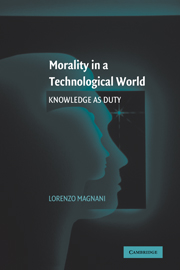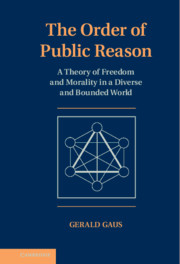Morality in a Technological World
The technological advances of contemporary society have outpaced our moral understanding of the problems that they create. How will we deal with profound ecological changes, human cloning, hybrid people, and eroding cyberprivacy, just to name a few issues? In this book, Lorenzo Magnani argues that existing moral constructs often can not be applied to new technology. He proposes an entirely new ethical approach, one that blends epistemology with cognitive science.
- Reveals the unexpected ways technology affects our lives
- Examines the status of current ethical reasoning
- Offers different approaches to making ethical decisions and enhancing responsibility in a technological world
Reviews & endorsements
"Magnani provides a stimulating exploration of the ethical implications of the medicalization of life, cybernetic globalization and the commodification of our lives through globalization. He advances an original and controversial thesis that will re-orient philosophical discussion of ethical issues toward a new account of moral reasoning that recognizes the cognitive constraints of reasoning, the social and cultural context in which it takes place and the impact of technologies and changing economic circumstances. This book is essential reading for everyone interested in the impacts of social, economic and technological change on ethical and legal theory."
David Gooding, Director, Science Studies Centre, University of Bath, UK
"This book integrates several fields of ethics, philosophy of technology, epistemology, and cognitive science, developing a completely new and challenging perspective from which Magnani makes the case for knowledge-centered morality. From the interesting and counterintuitive premise - respecting people as things in favor of reconfiguring or saving human dignity in our technological world - the discourse moves towards extremely significant but controversial claims supporting the belief that changes of moral value mainly result from human acts of cognition. Magnani clearly contends that we should seriously adopt this thesis of knowledge if we concede that technology has entirely turned both nature and ourselves into the object of human responsibility.
-Li Ping, Sun Yat-sen University
"[Morality in a Technological World] is a masterpiece. It is completely innovative. It will change argumentation in several branches of cognitive science forever – and moreover in a way that is absolutely essential for the information age. It will change legal argumentation, because such argumentation, as Magnani shows must, in the information age, undergo a fundamental revolution if people are to be protected, and even defined, in such a way that preserves their coherence, integrity, and dignity."
Michael Leyton, Center for Discrete Mathematics & Theoretical Computer Science, Rutgers University
"Morality in a Technological World is a deftly argued and insightful exploration of the interconnections among morally significant kinds of change—technological, epistemic, and ontological. It is a highly valuable original contribution to agent-centered resource-based analyses of human behavior and to moral theory." - John Woods, University of British Columbia, Journal of Value Inquiry
[Magnani] challenges us to think both cognitively and philosophically about moral and ethical dilemmas, in light of new approaches to technological development. In doing so he awakens important discussions around consciousness, humanity, free will and responsibility, and their interconnectedness; in fact, how do we treat people as things, rather than means? He opens up a space in which we can fruitfully discuss the balance between individual, corporate, national and supra-national needs and expectations, in terms of developing individual self-efficacy and agency. In a period of accelerating technological change, where both individually and collectively we are casting longer data shadows within expanding networks, this is an important and timely discussion." -Richard Hall, De Montfort University, Journal of Information, Communication & Ethics in Society
Product details
October 2009Paperback
9780521121798
308 pages
229 × 152 × 18 mm
0.46kg
Available
Table of Contents
- 1. Respecting people as things
- 2. Treating people as means
- 3. Hybrid people, hybrid selves
- 4. Knowledge as duty
- 5. Freedom and responsibility
- 6. Creating ethics
- 7. Inferring reasons.






